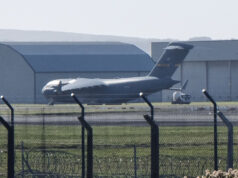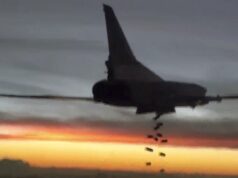Hardliners in Russia have been calling for a full-scale mobilisation for some time, but so far Vladimir Putin has resisted the temptation for a full call-up due to its expected unpopularity.
Instead, Russia is attempting to persuade thousands of men to enlist voluntarily as contract soldiers.
The Kremlin’s recruitment campaign is designed to appeal to their sense of national pride and injured masculinity. But my research with working-class men – the primary targets of the campaign – suggest it is unlikely to succeed.
This article was authored by Charlie Walker, Associate Professor of Comparative Sociology, University of Southampton.
This article is the opinion of the author and not necessarily that of the UK Defence Journal. If you would like to submit your own article on this topic or any other, please see our submission guidelines.
Using gender as a political strategy has been central to Putin’s success. In the early days of his presidency, he liked to portray himself as an all-action military man, and later arranged photoshoots of himself fishing and riding horses bare-chested in the Russian wilderness. Putin used these displays of masculinity to project strength to a public for whom Russia’s weakness during the 1990s had been personified by his often-drunk predecessor Boris Yeltsin.
This performance of a strong masculinity clearly had a broad appeal, as evidenced by the hit pop song: A Man Like Putin:
A man like Putin, so full of strength.
A man like Putin, who doesn’t get drunk.
A man like Putin, who wouldn’t hurt me.
A man like Putin, who won’t run away.
But it was also targeted at particular sections of the Russian electorate that Putin came to count on most for support. Famous incidents, such as his humiliation of oligarch Oleg Deripaska for not paying workers at an aluminium plant, made it clear that one of the planks of his popularity was his ability to target those who had lost out in the new, brutal market environment of the 1990s and craved some level of stability. This was an earlier instance of the populist appeal of Donald Trump to America’s “left behind”.
By contrast, those men who were more successful in the new service and consumer economies – many of whom came to demand more political freedoms in the protests of 2011-13 – were never an important constituency for Putinism. And, when Russia launched its full-scale invasion of Ukraine in 2022, they left Russia in their droves.
Needed: cannon fodder
Russia currently needs to enlist more men to its armed forces. The country has already squandered tens of thousands of lives in its disastrous war in Ukraine – including many of those mobilised in the autumn of 2022. As part of the current recruitment campaign a TV advertisement depicts a security guard, a fitness instructor and a taxi driver apparently questioning the manliness of their jobs and opting instead for the army. The campaign shows it’s ordinary working-class men – most of whom have military training – to whom Putin is appealing.
The inability of men to live up to expectations of them as breadwinners was one of the factors explaining the Russian mortality crisis of the 1990s, when male life expectancy dropped as low as 59 years. This affected working-class men more than any other socio-demographic group, with psycho-social stress, accidents, suicide and alcoholism all featuring highly.
But my research with young and middle-aged working-class men in provincial Russia suggests that they are neither as desperate nor as insecure – not to mention patriotic – as the campaign assumes. So they won’t be swayed by these appeals to their insecurities to quit their jobs and go to the front.
A pragmatic working class
Working-class men from provincial towns such as Ulyanovsk, where I conducted research from 2004-2015, are almost universally conscripted into the army after leaving vocational training colleges at the age of 18. In contrast to Marina Yusupova’s research, in which men from a range of backgrounds did everything to avoid military service and were broadly critical of the army, my respondents were often positive both about the prospect of army service before they left, and about their experiences upon returning.
Army service was framed pragmatically, as an opportunity to build physical strength and personal discipline. It was also viewed as a means of improving one’s earning capacity as a manual worker – literally “becoming a man”. Serving in the army also opened doors to a range of civil service careers, as various branches of the state – the police force, the prison service, inland revenue, for example, all of which have been strengthened throughout the Putin era – recruited them as they were completing their service.
It was precisely their pragmatism that enabled many of the young and older men in my research to use their skills and contacts and the opportunities afforded them to achieve their goal of becoming breadwinners. They were able to secure mortgages and start families, despite their precarious economic circumstances. Many set up their own businesses. They became builders, dispatchers, merchandisers, tyre-fitters, mobile phone repairers and the like. Unlike the men of the 1990s and early 2000s, who were brutally displaced by the collapse of the Soviet economy, they have been able to adapt.
So it’s difficult to imagine a campaign targeting perceived insecurities around breadwinner status or straightforward patriotism having a significant impact, even on members of a socio-demographic group that has been a primary target of Putinism.
An unstated aim of the current recruitment campaign, then, is to provide a veneer of consent for what can now only be achieved through coercion. A full-scale mobilisation of the male population – for which the recent (possibly false flag) drone attacks in Moscow may act as a pretext – would confirm as much.
Men will still be found to be sent to the Donbas, but few will go there willingly.![]()
This article is republished from The Conversation under a Creative Commons license. Read the original article.













Can’t be right can it? According to our resident troll he claimed in another thread there are 13000 volunteers a month! 🤔who shall we believe?
I think Johnski must be telling the truth. He has a rich history of stating facts. RFS Moskva not on fire, Russian advances going well, Kherson and Bakhmut battles all carefully correographed to cause disproportionate casualties to Ukraine. Etc etc.
The guys a genius.
So 13,000 volunteers a month???? Me thinks not. Even the Russian uneducated peasants can see the numbers being buried and returning to mother Russia in body bags.
He is going full on in the RAF shadows Orc jets thread😂
apparently the Orcs are fully in control and it’s the UKR losing ground etc in the offensive🙄
JohninMK had the Moskva tied up alongside in Sevastopol when she had sunk. He used an old technique (pioneered by our own B.B.C. in dark days) of telling 40 per cent truth and 60 per cent invention. An unpleasant piece of work.
Johnski… From Milton Keynes apparently. That’ll be the Milton Keynes basement suite in the Kremlin or FSB headquarters
MK – Magnitogorsk.
https://en.wikipedia.org/wiki/Magnitogorsk
Love it. 😂🤣😂🤣👍
the russians have a freudian death drive according to this link, they can’t be like the West so they will destroy What lies behind Russia’s acts of extreme violence? Freudian analysis offers an answer | Peter Pomerantsev | The Guardian
But the Chinese although numerically strong and developing near peer levels of equipment and munitions advancement are A) untested. B) don’t appear to have the dissimilar combat training that NATO nations frequently exercise and C) Currently lack reach in terms of underway replenishment and overseas basing to break out of the 1st island chain.
The US containment strategy is currently working. Meanwhile the West has woken up to the dangers of China stealing intellectual property and advanced technology enabling them to leap frog generations.
They would be better off in terms of recruitment just to state their current tactics.
“Sign up to the Russian army, fight in Ukraine. Ample opportunity to rape, loot, abduct children, torture civilians, breach the Geneva convention, commit human rights abuses and undertake crimes against humanity to your very heart’s desires”.
I’m sure thousands of really salt of the earth individuals will sign up then to join like minded Ruskfascists already in Ukraine.
“We have the manliest recruitment ads. All our soldiers are so manly.”
“OMG! GBU-28s! Yas queen!”
Ummm what ? Have you been at the Port Dern ? ( I have).
“Americans are so weak, using they/them pronouns.”
“That’s okay Russia we have a new set of pronouns for your army. Was/Were”
a whole new set of pronouns good work that was.
😂😂😂
I saw a drone video showing retreating Russian soldiers being gunned down by their own as they thought they reached safety. Combine that with inadequate equipment, harassment and bullying from superiors, missing wages etc. and it shows an army (if not a society) in collapse. The fact that there or not that many reports of mutiny within the Russian ranks I attribute to apathy rather than patriotism.
I seen that video too. Shocking. The retreating troops labelled as “Wagner mercenaries” weren’t even armed and were shot in cold blood. FSB control of the rear echelon has a new meaning in the Russian armed forces when they kill their own unarmed soldiers.
Its hard to be masculine when a Ukrainian has just blown your balls off! Typical dumb Russian efforts at recruiting the sad, the dross and the stooopid!
Very interesting article by Prof. Walker. Thank you for sharing this here, George.